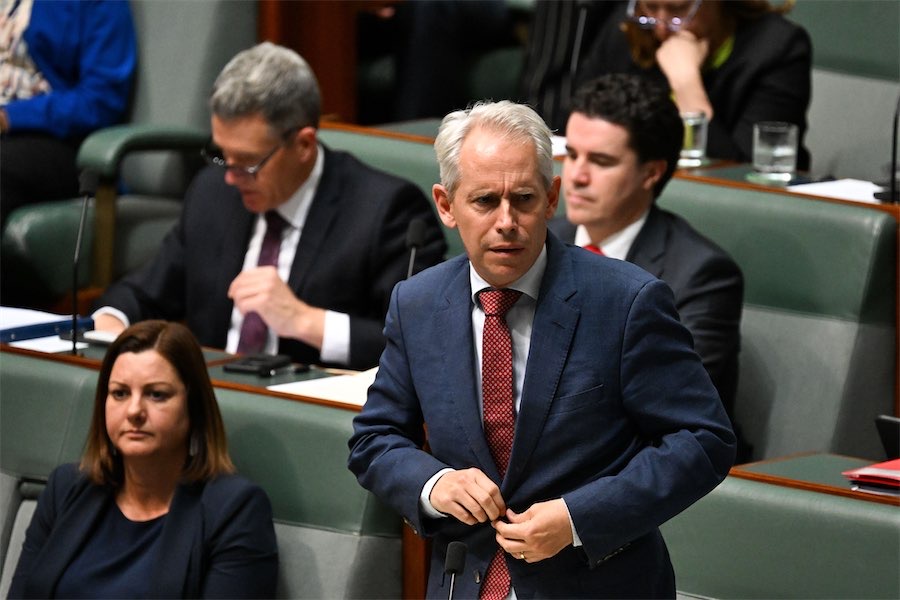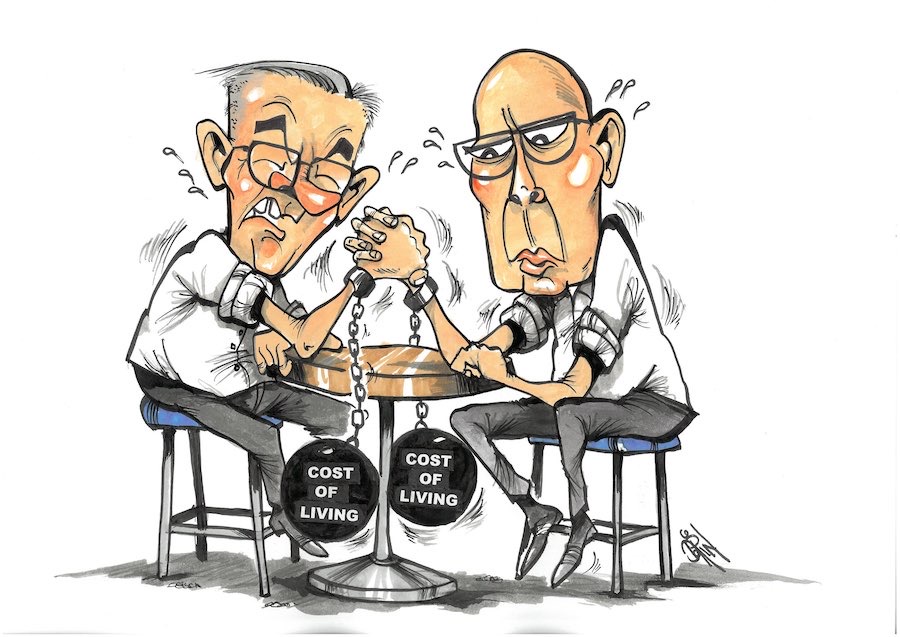
A government in a big hurry gives opposition some wins on ex-detainees, writes political columnist MICHELLE GRATTAN.
IT’S not very often we see a bill marched through parliament at such a pace as this week.

After being caught on the hop by the High Court, the government has brought in emergency legislation to strengthen its powers to control more than 80 people, some of them serious criminals, it has been forced to release from immigration detention. The bill was introduced in the lower house on Thursday morning and passed the parliament Thursday night.
Those of an irreverent turn of mind might recall Scott Morrison’s Great Strawberry Crisis of September 2018, when a bill was also raced through in a day.
Both the strawberry bill and this one were enacted in the name of “keeping the community safe”.
The strawberry exercise, following the discovery of needles in some fruit, was an obvious political stunt. This week’s legislation goes to a serious matter, although there’s dispute about the threat to community safety, given the risks posed by these people aren’t greater than those presented by local criminals who leave jail. The difference is these are non-citizens.
The High Court isn’t usually front and centre in politics. But when it is, it can land sharp punches that throw governments off balance.
The Albanese government always knew the court might rule, as it did last week, that people can’t be held indefinitely in immigration detention. But on the basis of its past record, the odds seemed against it doing so.
The Coalition says the government failed to take into account a hint months ago from one judge. Certainly the government wasn’t as prepared as it should have been when the decision came.
It initially concentrated on putting conditions into people’s visas and making sure security and law enforcement authorities were prepared.
It was quickly obvious, however, that a robust response would be required. Regardless of the logic, the argument that these people pose no more danger than do post-sentence Australians wouldn’t wash. This was especially obvious when media stories appeared about frightened victims.
The government’s situation was complicated by the court’s delay in providing reasons for its decision (on which, incidentally, we don’t know whether the judges were unanimous or split).
The explanation of the court’s action is that this was a habeas corpus case, so the court’s first duty was to the individual at the centre of it. That meant when it decided the man should be released, it had an obligation to say so immediately.
Immigration Minister Andrew Giles, a junior minister, visibly struggled under the Coalition’s attack in parliament. The optics weren’t helped by the departure of Anthony Albanese late Wednesday for the APEC meeting in the US. It’s been reported this was a trip the PM would have preferred to miss, but felt obliged to make because Joe Biden expected him to be there.
The High Court decision affected immediately more than 90 people, a number of whom had been convicted of major crimes including murder and rape. More than 80 have been released. The total number potentially involved could run into the hundreds.
The government kept repeating it had no choice but to let the detainees out at once. Minister for Home Affairs Clare O’Neil said: “If I had any legal power to do it, I would keep every one of those people in detention. Some of those people have committed deplorable, disgusting crimes. I am raising three children in this country, and I want a safe Australia.”
The emergency legislation, ticked off by a special caucus meeting, meant the Commonwealth could deploy ankle monitoring bracelets and impose curfews.
There was a catch-22 in the powers the government previously had. If a person breached their visa obligations, they could be sent to immigration detention – but after the court judgement, that penalty was no longer available. This made legislation necessary, so people could be jailed.
The government rushed the bill through the House of Representatives on Thursday morning in about an hour. The opposition was not allowed to move amendments.
The Coalition prepared several amendments, substantially broadening the restrictions, to pursue in the Senate. But, anxious to lower the temperature, speed the bill’s passage, and get the issue off the table, acting Prime Minister Richard Marles approached Opposition leader Peter Dutton. Marles and other ministers met Dutton in Marles’ office, and the government agreed to all the opposition amendments. They included mandatory minimum sentencing for visa breaches – which is inconsistent with Labor’s platform. It’s understood Albanese was kept abreast of things.
The legislation may be stopgap because, without the court’s reasons the government is working, to a degree, in the dark. More legislation could be needed next year.
The Greens have denounced the extra controls. The Greens’ Nick McKim told the Senate. “Make no mistake, this is Prime Minister Albanese’s ‘Tampa’ moment and history will condemn him for this, just as it condemned Mr Howard and Mr Beazley over 20 years ago”. This was a reference to Coalition legislation for a drastic response to the asylum seekers on the ‘Tampa’.
McKim accused Labor of “an abject craven capitulation by a party that has forgotten where it came from, and forgotten what it used to stand for.” He predicted a High Court challenge to the legislation.
David Manne, executive director of Refugee Legal, says a challenge is “absolutely” possible. He says the new law confers “extraordinary powers” that are beyond necessity and proportionality.
Manne says the controls imposed could involve another deprivation of a person’s liberty, when the High Court has just ruled against the deprivation of their liberty.
In crude political terms, Labor knows it is always potentially vulnerable on issues involving asylum seekers and refugees. That vulnerability is on two flanks. The Coalition will exploit any situation to paint Labor as weak. The Greens will cast Labor as heartless.
The government hopes the legislation provides the necessary belt and braces to send the community the message that, despite initial fumbling, it is in control of this unexpected situation.![]()
Michelle Grattan, Professorial Fellow, University of Canberra. This article is republished from The Conversation.
Who can be trusted?
In a world of spin and confusion, there’s never been a more important time to support independent journalism in Canberra.
If you trust our work online and want to enforce the power of independent voices, I invite you to make a small contribution.
Every dollar of support is invested back into our journalism to help keep citynews.com.au strong and free.
Thank you,
Ian Meikle, editor





![For graphic designer Tracy Hall, street art is like any artwork, her canvas has been swapped out for fences and plywood, her medium changing from watercolours to spray paint.
A Canberra resident for 13 years, Tracy has been a street and mural artist for the past five.
Her first exploration into grand-scale painting was at the Point Hut toilets in Banks five years ago. “They had just finished doing up the playground area for all the little kids and the words [of graffiti] that were coming up weren’t family friendly,” she says.
“So I ended up drawing this design and I got approval for the artwork.”
Many of Tracy’s time-consuming artworks are free, with thousands of her own dollars put into paint.
@traceofcolourdesigns
To read all about Tracy's fabulous street art, visit our website at citynews.com.au or tap the link in our bio! 🎨🖌
#canberranews #citynews #localstories #canberrastories #Citynews #localnews #canberra #incrediblewomen #journalism #canberracitynews #storiesthatmatter #canberralocals #artist #streetart #streetartist #StreetArtMagic](https://citynews.com.au/wp-content/uploads/sb-instagram-feed-images/490887207_1225841146218103_6160376948971514278_nfull.webp)


Leave a Reply